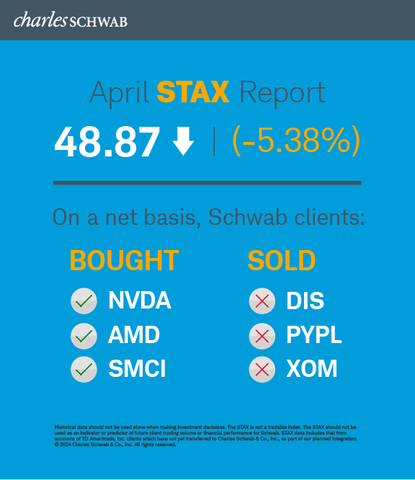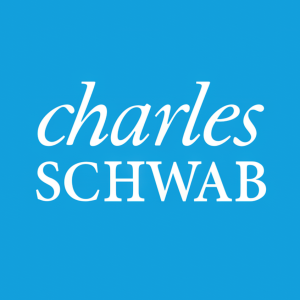Schwab Trading Activity Index™: Score Declines to Moderate-Low Levels in April Amid Market Volatility
Schwab clients were net buyers in April, finding several opportunities to increase exposure, notably in technology-related names

Schwab Trading Activity Index April 2024 (Graphic: Charles Schwab)
The reading for the four-week period ending April 26, 2024, ranks “moderate low” compared to historic averages as investment exposure decreased.
“The April STAX period was marked by volatility as major indices took a breather from a five-month winning streak and had their worst month since September, despite solid corporate earnings,” said Joe Mazzola, Head Trading & Derivatives Strategist at Charles Schwab. “While Schwab clients were net buyers of equities, the investor enthusiasm that characterized the March results began to wane in April, pushing down the STAX score for the month. Clients were more discerning with their purchases, preferring to gravitate towards companies with strong fundamentals, particularly those with compelling generative AI solutions. Those companies continue to rank near the top of our client buy lists.”
On April 3,
Popular names bought by Schwab clients during the period included:
- NVIDIA Corp. (NVDA)
- Advanced Micro Devices Inc. (AMD)
- Super Micro Computer Inc. (SMCI)
- Amazon.com Inc. (AMZN)
- Microsoft Corp. (MSFT)
Names net sold by Schwab clients during the period included:
- Walt Disney Co. (DIS)
- PayPal Holdings Inc. (PYPL)
- Exxon Mobil Corp. (XOM)
- Devon Energy Corp. (DVN)
- Occidental Petroleum Corp. (OXY)
About the STAX
The STAX value is calculated based on a complex proprietary formula. Each month, Schwab pulls a sample from its client base of millions of funded accounts, which includes accounts that completed a trade in the past month. The holdings and positions of this statistically significant sample are evaluated to calculate individual scores, and the median of those scores represents the monthly STAX.
For more information on the Schwab Trading Activity Index, please visit www.schwab.com/investment-research/stax. Additionally, Schwab clients can chart the STAX using the symbol $STAX in either the thinkorswim® or thinkorswim Mobile platforms.
Investing involves risk, including loss of principal. Past performance is no guarantee of future results.
Content intended for educational/informational purposes only. Not investment advice, or a recommendation of any security, strategy, or account type.
Historical data should not be used alone when making investment decisions. Please consult other sources of information and consider your individual financial position and goals before making an independent investment decision.
The STAX is not a tradable index. The STAX should not be used as an indicator or predictor of future client trading volume or financial performance for Schwab. STAX data includes that from accounts of TD Ameritrade, Inc. clients which have not yet transferred to Charles Schwab & Co., Inc., as part of our planned integration.
TD Ameritrade, Inc., member FINRA/SIPC, a subsidiary of The Charles Schwab Corporation.
About Charles Schwab
At Charles Schwab, we believe in the power of investing to help individuals create a better tomorrow. We have a history of challenging the status quo in our industry, innovating in ways that benefit investors and the advisors and employers who serve them, and championing our clients’ goals with passion and integrity.
More information is available at aboutschwab.com. Follow us on X, Facebook, YouTube, and LinkedIn.
0524-0Z61
View source version on businesswire.com: https://www.businesswire.com/news/home/20240506263012/en/
At the Company
Margaret Farrell
Director, Corporate Communications
(203) 434-2240
margaret.farrell@schwab.com
Source: The Charles Schwab Corporation






